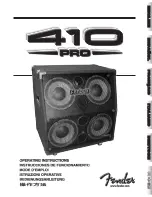
Preamplifier Features (3155)
Digital-ready design.The amplifier’s line-level inputs will not be overloaded by high-level signal peaks
from a Compact Disc player or digital tape recorder. The 103 dB signal-to-noise ratio of the 3155
exceeds that of any analogue or digital program source. The low-impedance, low-noise design of the
volume and tone control circuits guarantees that the transparent clarity of the finest analogue and
digital recordings will be preserved.
The phono preamplifier, too, is audibly (and in some cases dramatically) quieter than most other preamp
circuits, not only with moving-magnet pickups but also with low-output moving coil cartridges. The
entire amplifier circuit has ample dynamic range for every program source, including the widest-range
digital Compact Discs. Ultra-quiet MM and MC phono preamp circuits. As long as LPs remain a principal
music source, there must be no compromise in the phono preamp. The phono circuit in the NAD 3155
employs ten selected transistors per channel to obtain the widest possible dynamic range with
outstanding freedom from noise and distortion at all signal levels. A differential FET input circuit ensures
ultra-low-noise operation at the high impedances of MM cartridges, and its linearity in the MegaHertz
range, aided by a custom-wound input filter, provides exceptional rejection of all interference from TV,
CB radio, and computers. A separate high-gain MC pre-preamp stage uses newly developed transistors
optimised for lowest noise with low MC impedances. A push-pull high-current output circuit drives the
precision RIAA equalisation network without slewing distortion, and its 107 dB dynamic range comfort-
ably accommodates all digitally-mastered LP recordings with room to spare.
Bass EQ
A special equalisation circuit provides 6 dB of boost at 32 Hz in order to strengthen and extend the
deep-bass response of closed-box loudspeaker systems.
A typical bookshelf speaker that rolls off below 50 Hz will have strong output to 30 Hz when used with
the NAD 3155, providing the sort of authentic bass “feel” that might otherwise require a costly separate
subwoofer system. Infrasonic filter, Precise infrasonic filtering is included to eliminate signal
contamination from turntable rumble, record warps, tonearm/stylus resonances, vibration and acoustic
feedback. This guarantees the cleanest possible handling of signals within the audible range and
eliminates the excessive woofer-cone excursions that can cause intermodulation distortion and muddy
bass in systems without filtering.
Power Amplifier Features (3155 and 2155)
Loudspeaker impedance matching. Standard lab tests of amplifiers use 8-ohm resistors in place of
loudspeakers, But most loudspeakers have a lower and more complex impedance that increases the
required amplifier output current. (And if you connect two pairs of loudspeakers, the effective
impedance of the pair is halved.) For this reason the 3155 and 2155 amplifiers are designed to deliver
their maximum power into low impedances of 4 or even 2 ohms. But the exclusive NAD impedance
selector allows you to re-optimise the amplifier circuit to produce greater output voltage, for the most
effective delivery of power to loud-speakers whose true impedance is 8 ohms or higher.
Soft Clipping
NAD’s trademarked Soft Clipping circuit gently limits the waveform when the amplifier is driven beyond
its maximum power rating. By preventing the out-put transistors from being driven fully into saturation,
the Soft Clipping reduces the harshness that is normally heard when an amplifier is overdriven. Because
of this and the amplifier’s high dynamic headroom, the sound remains clean and musical even at very
high sound levels, rather than being distorted as in other amplifiers.
Bridging
If still more output power is needed, a bridging switch immediately converts the stereo amplifier into a
monophonic unit conservatively rated at 150 watts. A matching NAD 2155 power amplifier (also
bridged) can be used for the second stereo channel. With an IHF dynamic headroom of +2.5 dB in the
bridged mode, the 3155 and 2155 can produce peak levels of over 250 watts per channel for musical
transients. The combination of the 3155 and 2155 in bridged mode becomes, in effect, the world’s most
powerful integrated amplifier while retaining all of the operating simplicity of the 3155 amplifier alone.
Since the 3155 has independent preamp outputs and power amp inputs, it can also be used with an
electronic crossover for bi-amplification with either full-range speakers or a separate sub-woofer.






















